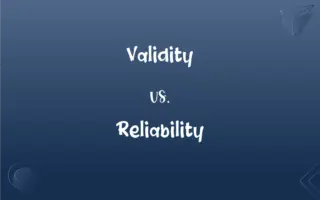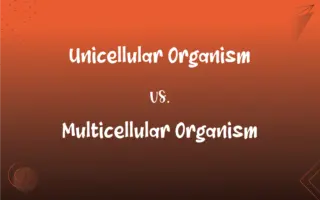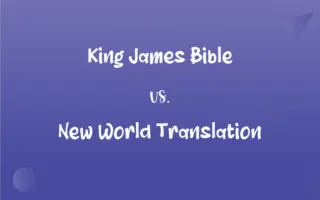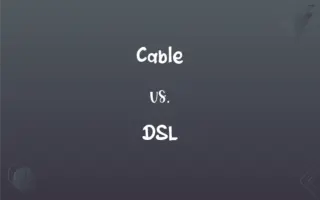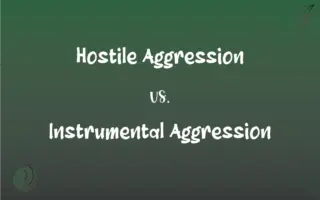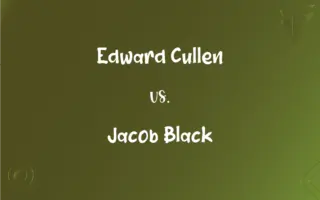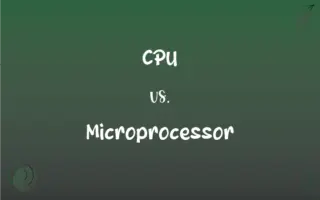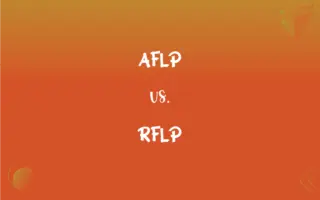Trade-off vs. Opportunity Cost: What's the Difference?
Edited by Aimie Carlson || By Harlon Moss || Updated on October 11, 2023
Trade-off involves sacrificing one thing to gain another, while opportunity cost is the value of the next best alternative forgone. Both concepts revolve around making choices amidst scarcity.
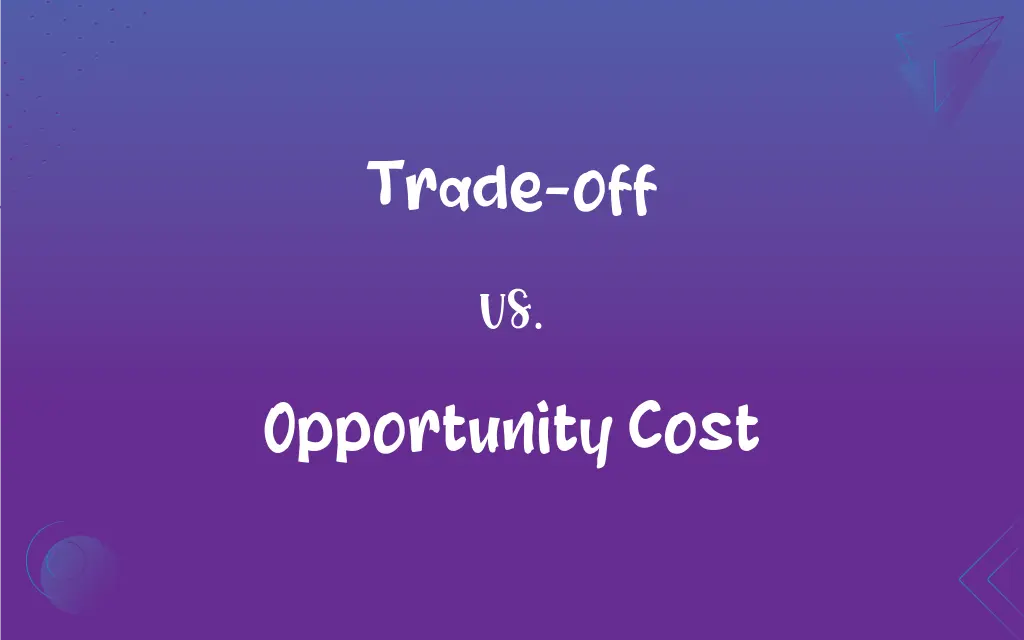
Key Differences
Trade-off and opportunity cost are economic terms that describe different aspects of decision-making under conditions of scarcity. A trade-off refers to the concept of giving up a particular benefit or advantage in order to gain another, which is considered more valuable. It's the balancing act of choosing between two competing desires or benefits. Opportunity cost, meanwhile, relates directly to the cost of forgoing the next best alternative when making a decision. It embodies the benefits you could have received if you chose the alternative option.
Both concepts articulate the choices and sacrifices involved in decision-making. Trade-offs highlight the aspects of losing and gaining in any decision, implying that to acquire something, something else of value must be given up. Opportunity cost, on the other hand, quantifies the comparative value of the forgone choice, implying that every decision effectively “costs” the alternative that was not selected. It reflects the benefits that could have been achieved if resources were allocated differently.
At a closer glance, trade-offs don’t explicitly specify what is being lost in numerical terms or value terms but rather highlights the existence of a sacrifice. It primarily demonstrates the principle that resources (time, money, energy) are finite and allocating them in one direction naturally means they cannot be allocated elsewhere. In contrast, opportunity cost generally attempts to articulate the tangible or intangible value of the alternative choice, giving a metric to what is being lost and providing a comparison point for decision-making.
Further, trade-offs are generally present in virtually all decision-making scenarios, revealing the ever-present reality that choices have to be made where resources are limited. The term “trade-off” doesn’t in itself prioritize one decision over another but merely acknowledges that a choice needs to be made. On the other side, opportunity cost always directs attention to what is being missed out on, offering a value-driven perspective on the alternative, and implies a loss of potential gain from other alternatives when one alternative is chosen.
In applications, for instance, a business might face a trade-off when deciding between investing in two different ventures. The concept underscores that choosing one venture necessarily excludes the other. Opportunity cost in this scenario would refer to the profits that were forsaken by not investing in the second venture, introducing a calculative aspect into the decision-making process. Both terms together weave the narrative of choosing, sacrificing, and evaluating in the economic landscape of decision-making.
ADVERTISEMENT
Comparison Chart
Definition
Sacrificing one benefit to gain another.
Cost of the next best alternative forgone.
Implies
Sacrifice
A comparative loss
Expression
Often qualitative
Typically quantitative
Application in Decisions
Broad: reflects choices and sacrifices
Specific: reflects value of forgone choice
Contextual Usage
Widespread across various decision-making realms
Primarily used in economic decisions
ADVERTISEMENT
Trade-off and Opportunity Cost Definitions
Trade-off
A balance achieved between two desirable but incompatible features.
The trade-off between speed and accuracy in data entry is often challenging.
Opportunity Cost
The cost of forgoing the second-best option when making a decision.
The opportunity cost of buying a new car may be the international vacation you can’t afford as a result.
Trade-off
A compromise between two choices or situations that are mutually exclusive.
The trade-off between spending time working and studying can be difficult for working students.
Opportunity Cost
The value of the next best alternative forgone.
Attending a concert has the opportunity cost of missing a potentially productive study session.
Trade-off
A situation involving loss of one quality in return for gain in another.
There’s often a trade-off between convenience and security in software design.
Opportunity Cost
A concept valuing the benefits sacrificed when one alternative is selected over another.
Spending your savings on a lavish holiday carries the opportunity cost of not investing that money.
Trade-off
An exchange where you give up one thing in order to get something else.
The company faced a trade-off between investing in marketing or new product development.
Opportunity Cost
The loss of potential gain when one alternative is chosen over others.
Investing in stocks involves an opportunity cost if bond yields subsequently increase.
Trade-off
A decision-making strategy that involves giving up certain benefits to achieve others.
Developing nations may experience a trade-off between economic growth and environmental protection.
Opportunity Cost
A measure of the benefit that could have been enjoyed had a choice been made differently.
Choosing to work overtime has the opportunity cost of lost leisure time with family.
Trade-off
An exchange of one thing in return for another, especially relinquishment of one benefit or advantage for another regarded as more desirable
"a fundamental trade-off between capitalist prosperity and economic security" (David A. Stockman).
Trade-off
Any situation in which the quality or quantity of one thing must be decreased for another to be increased.
In writing, there's often a trade-off between being concise and being complete.
Trade-off
An exchange that occurs as a compromise;
I faced a tradeoff between eating and buying my medicine
FAQs
Is every trade-off also an opportunity cost?
Not exactly, every opportunity cost involves a trade-off, but not all trade-offs precisely quantify the next best alternative’s value.
How can one minimize negative trade-offs?
Minimizing negative trade-offs involves carefully assessing and choosing options that maximize overall benefit.
Is opportunity cost always financial?
No, opportunity cost can also refer to non-financial factors, such as time or enjoyment.
How is opportunity cost calculated?
Opportunity cost is calculated by evaluating the benefits that are forgone by not choosing the next best alternative.
Are trade-offs always monetary?
No, trade-offs can also involve non-monetary aspects like time, convenience, or psychological benefit.
Can trade-offs be quantified?
Trade-offs can be quantified if the aspects being compared can be measured, though this is not always straightforward.
Can trade-offs be avoided?
Trade-offs are inherently present in every decision where resources like time and money are limited.
How is opportunity cost defined?
Opportunity cost is the value of the next best alternative that is forgone when a decision is made.
Can opportunity cost be zero?
In theory, if the value of the chosen option and the next best alternative are equal, opportunity cost could be zero.
How does understanding trade-offs influence resource allocation?
Understanding trade-offs enables more strategic resource allocation by revealing what must be sacrificed to gain benefits elsewhere.
Can a decision have both a trade-off and an opportunity cost?
Yes, most decisions involve a trade-off in choosing and an opportunity cost related to forgone alternatives.
How can opportunity costs impact decisions?
Considering opportunity costs can influence decisions by highlighting the potential benefits that would be sacrificed.
Does recognizing trade-offs aid in better decision-making?
Yes, recognizing trade-offs allows for a more comprehensive understanding of the implications of a decision.
Why does opportunity cost matter in economic theories?
Opportunity cost is crucial in economics for analyzing the efficiency, benefits, and costs of resource allocation choices.
Can recognizing opportunity costs alter personal spending habits?
Yes, recognizing opportunity costs can influence spending by highlighting the potential value of alternative financial decisions.
What is a trade-off?
A trade-off involves sacrificing one benefit in order to gain another.
Can trade-offs be beneficial?
Yes, trade-offs can be beneficial if the chosen option provides more value or satisfaction than the forgone alternative.
Is opportunity cost relevant to businesses?
Absolutely, businesses regularly consider opportunity costs in investment, production, and operational decisions.
How do economists utilize the concept of opportunity cost?
Economists use opportunity cost to understand the potential benefits that are sacrificed through various economic decisions and policies.
Is opportunity cost a tangible expense?
No, opportunity cost is not an actual expense but represents the foregone benefit of the alternative not chosen.
About Author
Written by
Harlon MossHarlon is a seasoned quality moderator and accomplished content writer for Difference Wiki. An alumnus of the prestigious University of California, he earned his degree in Computer Science. Leveraging his academic background, Harlon brings a meticulous and informed perspective to his work, ensuring content accuracy and excellence.
Edited by
Aimie CarlsonAimie Carlson, holding a master's degree in English literature, is a fervent English language enthusiast. She lends her writing talents to Difference Wiki, a prominent website that specializes in comparisons, offering readers insightful analyses that both captivate and inform.
